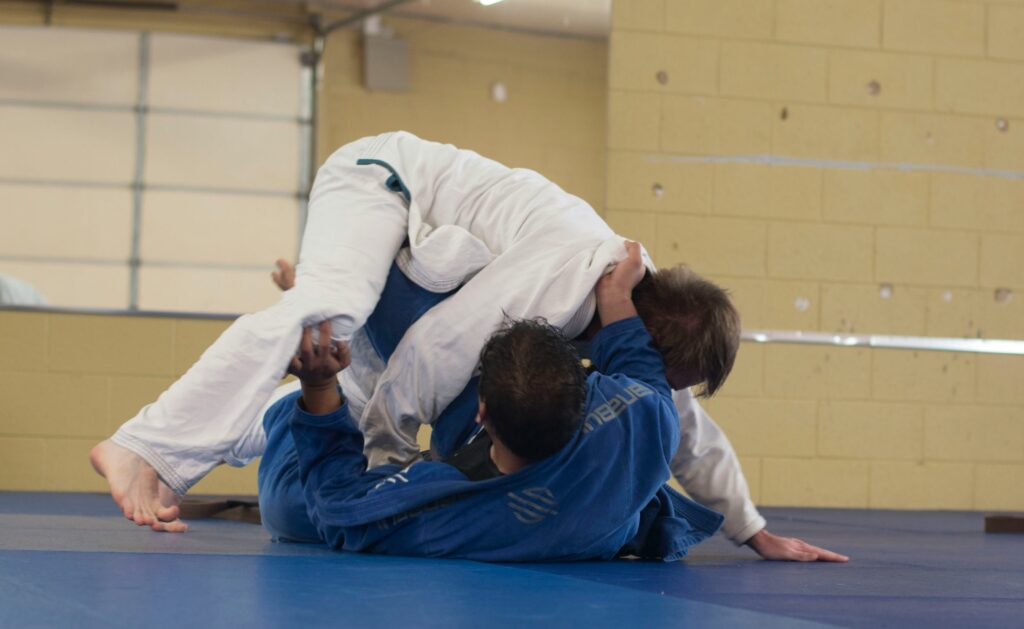Judo is a martial art that originated in Japan in 1882, which emphasizes strategy, technique, and precision when exhibiting physical strength. Knowing how to score in Judo is essential, as it determines the outcome of each match.
Judokas, or competitors, wear a gi (special uniform) during matches and aim to score points by executing techniques effectively and with control.
Basics of Judo Matches
Before diving into the scoring system of Judo, it is crucial to learn about the structure of a judo match.
In a competition, opponents face each other on a mat known as the tatami. Judo matches can last four minutes for both men and women at the senior level, and it may vary for juniors or different Judo contests.

Competitors use throws, pins or osaekomi, joint locks or kansetsu-waza, and chokes or shime-waza for outmaneuvering their opponents.
How to Score in Judo
Understanding how scores are awarded in Judo is a crucial aspect for the competitors and the spectators.
Ippon
Ippon is the highest score awarded to a judoka, and it immediately ends a judo match. It is awarded when a judoka achieves:
- Perfect throw with force, speed, and control
- Submission or forcing the opponent to tap out with a choke or joint lock
- Pinning or holding the opponent down on their back for 20 seconds.
Waza-Ari
Waza-ari is a point awarded to a judoka’s throw that is not quite perfect, but still shows excellent technique and control.
This can also be given when one holds their opponent down for 10 to 19 seconds. Two waza-ari points are equivalent to an ippon, which ends the match.
Yuko
In past Judo matches, yuko was known as a lesser score awarded for throws and holds that are not qualified as waza-ari or ippon.
However, this is no longer used for scoring in official Judo competitions.
Golden Score
If a judo match ends with a tie, it goes into Golden Score overtime, wherein the first judoka to score a waza-ari or ippon wins the match.
What Are the Penalties in Judo?
In Judo, penalties are categorized into two, which are shido (minor infractions) and Hansoku-make (major infractions).
These penalties help ensure fair play and safety in Judo matches.
Shido (Minor Infractions)
Shido is a minor penalty given to a judoka for minor rule violations, like:
- Passivity or avoiding the fight
- Stepping out of the mat or tatami
- False attacks or making attacks without the real intent to throw
- Grip breaking or breaking the opponent’s grip which does not abide by the rules of Judo
The first two shidos are warnings for a judoka, and if they receive a third shido in one Judo match, this can result in a Hansoku-make, which disqualifies them from the match.
Hansoku-make (Major Infractions)
Hansoku-make is a grave infringement given to competitors for serious rule violations, which include:
- Executing dangerous techniques or moves that can cause injury
- Intentional injury or deliberately harming the opponent
- Grabbing the opponent’s leg unless it is a part of a proper throw
- Severe unsportsmanlike conduct that is against the principles of Judo
A direct hansoku-make leads to disqualification from the match, and in severe infractions, the judoka may be barred from participating in the entire tournament.
What Are the Ways to Win in Judo?
The following are some of the ways that a Judo match can end:
- Scoring an ippon
- Scoring two waza-aris
- Opponent receives a hansoku-make penalty for a serious rule infraction
- Three shido penalties for minor infractions result in disqualification.
- Withdrawal from the match occurs if the opponent is injured.
Get Started on Learning Judo Today
Scoring in Judo matches requires mastery of different techniques, honing physical skills, and understanding strategic elements of the sport.
Familiarizing oneself with the rules and the scoring system and how penalties work can provide a strategic advantage.
For instance, being aware of the consequences of passivity in Judo can compel a competitor to stay active and responsive; as a result, they increase their chances of scoring a point.
If you want to learn more about Judo, consider Titans – Sports and Functional Gym. Our fitness center is known for offering different combat sports like Taekwondo and judo gym in Imus, Cavite.
With professional fitness enthusiasts and a welcoming community in martial arts, you can achieve your personal goals in the right environment.
Take your fitness to the next level with Titans’ diverse combat sports programs. Visit our official website at www.titansgymcavite.com and register today!
References:
https://www.kidsmartialartsguide.com/rules-of-judo-competitions/
https://www.nbcolympics.com/news/judo-101-olympic-rules-regulations-and-scoring
https://sports-star.co.uk/tips-and-tricks-on-how-to-beat-an-opponent-in-judo
https://livetoplant.com/understanding-judo-scoring-and-match-rules
